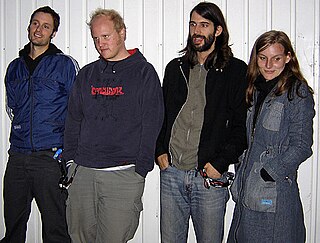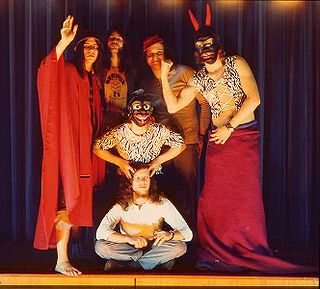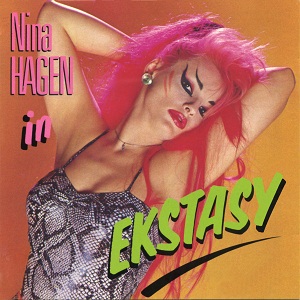History
The band was founded around the end of 1978, when they began their career as a German punk rock band; later they were ascribed to the Neue Deutsche Welle (NDW) movement, though their music is not typical of the NDW genre. It was influenced heavily by punk rock music, and their lyrics were often critical of politics and society. The members viewed themselves as punks, whose only association with the NDW was that they appeared at the same time. As testament to that, they wrote on their homepage: "Ja wir haben den Scheiß eben mitgemacht!" (Yeah, we went along with that shit).
The highlight of their career was seen from 1981 until 1983, as they played for sold-out crowds, had records go Gold and Platinum and were pictured on the cover of BRAVO . After two band members left the group in 1983, they released two albums: Europa and LP der Woche. After a creative break until 1987, the band returned with an album that was heavily influenced by The Cure. In the 1990s, Extrabreit moved onto writing lyrics highly critical of society and full of sharp sarcasm (a little bit similar to Dead Kennedys). Their new work did not enjoy the same commercial success of their earlier albums. After their 'Final concert' in the "Berlet Halle" Hagen - Hohenlimburg on 19 September 1998, the group went on to play in Bochum in 2002 and are touring Germany. Also they had in 2010 a concert with the Philharmonic Orchestra Hagen. In the past they recorded songs with Hildegard Knef, Harald Juhnke and Marianne Rosenberg.
Extrabreit played their 1000th concert on 27 August 2005 to several thousand fans in Hengsteysee in Hagen. The band was presented with their first Platinum record for their first major success in 1980.
Germany claims some of the most renowned composers, singers, producers and performers of the world. Germany is the largest music market in Europe, and third largest in the world.

Die Ärzte is a German rock band from Berlin. The band has released 14 studio albums. The group consists of guitarist Farin Urlaub, drummer Bela B and bass player Rodrigo González. All three write and perform their songs.
Switzerland has long had a distinct cultural identity, despite its diversity of German, French, Italian, Romansh and other ethnicities. Religious and folk music dominated the country until the 17th century, with growth in production of other kinds of music occurring slowly.
Neue Deutsche Welle is a genre of West German rock music originally derived from post-punk and new wave music with electronic influences. The term was first coined by Dutch radio DJ Frits Spits on the popular nationwide radio station Hilversum 3, which was very popular among German listeners. Soon after that, the term was used in a record-shop advertisement by Burkhardt Seiler in an August 1979 issue of the West German magazine Sounds. It was then used by journalist Alfred Hilsberg in an article about the movement titled Neue Deutsche Welle — Aus grauer Städte Mauern in Sounds in October 1979.

Catharina "Nina" Hagen is a German singer, songwriter, and actress. She is known for her theatrical vocals and rise to prominence during the punk and Neue Deutsche Welle movements in the late 1970s and early 1980s. She is known as "The Godmother of German Punk".

Wir sind Helden was a German pop rock band that was established in 2000 in Hamburg and based in Berlin. The band was composed of lead singer and guitarist Judith Holofernes, drummer Pola Roy, bassist Mark Tavassol and keyboardist/guitarist Jean-Michel Tourette.
German rock music (Deutschrock) came into its own only by the late 1960s, but spawned many bands spanning genres such as krautrock, Neue Deutsche Welle, heavy metal, punk, and industrial.

Fury in the Slaughterhouse is a German rock band from Hanover, founded in 1987. Their hits include "Time to Wonder", "Every Generation Got Its Own Disease", "Won't Forget These Days", "Radio Orchid", "Dancing in the Sunshine of the Dark", "Milk & Honey" and "Trapped Today, Trapped Tomorrow".

Juli is a German alternative pop band from Gießen, Hessen, consisting of singer Eva Briegel, guitarists Jonas Pfetzing and Simon Triebel, bassist Andreas "Dedi" Herde and drummer Marcel Römer. The band was formed with this lineup from the band Sunnyglade in 2001.

The Puhdys were a German rock band formed in Oranienburg, East Germany, in 1969, although by then they had been performing together—with various lineups—as the Puhdys since 1965. Although they are especially popular in their native eastern Germany, the Puhdys enjoyed significant success outside the GDR, and were one of the first East German bands allowed to tour West Germany. They are one of the most successful German-language rock groups.
Nichts is a German rock band from Düsseldorf that saw success with the Neue Deutsche Welle post-punk movement. Originally active from 1981 to 1983, it re-formed in 2009.
German punk includes a body of music and a subculture that have evolved since punk rock became popular in Germany in the 1970s. Within the subculture of punk in Germany, a style of music called Deutschpunk was developed; this style of music has developed distinctly from hardcore punk, and includes lyrics in German as well as a fast tempo. In the punk scene in Germany, some bands play music in the Deutschpunk style, while other German punk bands pursue various other styles of punk music.

Reinhold Heil is a German musician, producer, and film and television composer. He initially achieved success in Germany as a member of the post-punk and Neue Deutsche Welle groups Nina Hagen Band, Spliff and Nena, and later as a music producer.

Franziska Menke, known professionally as Frl. Menke, is a German singer. She was a star of the Neue Deutsche Welle genre of German popular music in the early 1980s. Menke is best known for her hit single "Hohe Berge", which was a top 10 hit in the German single charts in 1982 and has sold more than 2.5 million copies to date.

Grobschnitt was a West German rock band which existed between 1970 and 1989. Describing their style as "Solar Music", the band mixed psychedelic Krautrock with hard rock in the 1970s, before shifting to a more mainstream pop and rock style in the 1980s. Grobschnitt, unlike other bands, utilized humor in their music in the form of unexpected noises and silly lyrics and concepts.

Nina Hagen in Ekstasy is the third solo studio album by German singer Nina Hagen. It was released on January 10, 1985, by CBS Records. The German version of the album Nina Hagen in Ekstase was released simultaneously. It was Hagen's last album released on the CBS label, before her recording contract expired in 1986. The album is mainly produced by Adam Kidron and was recorded in Ibiza and Paris. Hagen worked with Karl Rucker and Billy Liesegang and wrote most of the songs on the album. Unlike her previous disco-influenced album Fearless (1983), Nina Hagen in Ekstasy is musically more punk rock with elements of dance music. It contains cover versions of Frank Sinatra's "My Way" and Norman Greenbaum's "Spirit in the Sky".
Spliff was a Neue Deutsche Welle rock band, active in the 1980s. Three of the members were already playing together in the political rock cabaret Lokomotive Kreuzberg before they were 'adopted' by Nina Hagen when she came to West Germany in 1977. They recorded two albums with her as the Nina Hagen Band before continuing under the name Spliff when Hagen went solo. Their characteristic sound was a mix of electronic music, reggae and punk rock. They recorded "The Spliff Radio Show" in 1980, their only album in English. After parting ways with vocalist Alf Klimek, the remaining members carried on in German sharing vocals between all four of them. Their album 85555 however was released in a limited English edition too. They had major hits on the German singles chart with "Carbonara", "Das Blech" and "Déjà vu". Despite their influential status, the band was short-lived.

"Eisbär" is a 1980 song by the Swiss Neue Deutsche Welle band Grauzone. A cult hit, it first appeared on the 1980 compilation album Swiss Wave – The Album. The shorter single version was later collected on the Grauzone album Die Sunrise Tapes (1998).
Neue Deutsche Todeskunst is a musical genre that developed in Germany in the late 1980s. It is credited with establishing the German language in the dark wave movement, although there were already such German bands as Xmal Deutschland, Geisterfahrer, and Malaria!.
Östro 430 is a four-piece punk band from Düsseldorf, Germany; they were the first all-female punk band in Germany. Although they see themselves as a punk band, they have also been classified as a key Neue Deutsche Welle band, and have been described as riot grrrl. The band reformed in 2019, and now hails from Hamburg.













